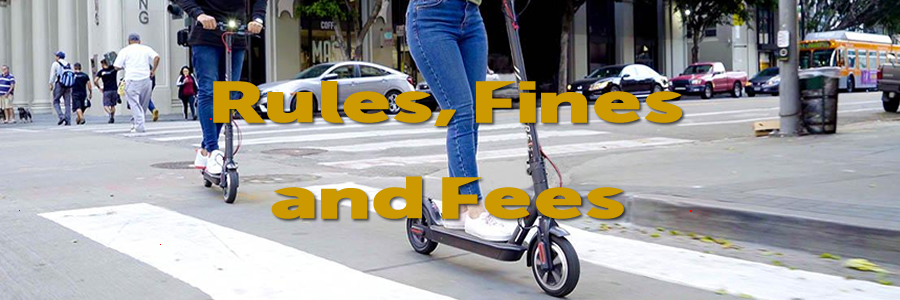Rules, Fines and fees: Unpacking the Costs of Flouting Micro-mobility Guidelines
With the price of fuel and train ticket prices on the rise, many people are riding bicycles and e-scooters to cut travel costs. Although opting for these forms of transportation can eliminate expenses, there are a lot of rules and restrictions to follow that could take a toll on your wallet if not followed.
With travel costs soaring many of us are thinking about ways to save money on our commute, but not knowing the various laws for transport can lead to a costly lesson in fines.
A recent study by Currys took a deep dive into the history of transport, including micro-mobility, which includes skateboards, bicycles, and the increasingly popular e-scooter.
As part of this research, they looked at some of the laws users of this type of transport could be unknowingly breaking, some of which come with a fine of up to £2,500.
Bicycles
£50 fixed penalty fine for jumping a red light:
Although this is something that most of us will have experienced first-hand, it is illegal for cyclists to run red lights.
When on the road it is important for their safety and the safety of others that cyclists obey traffic laws. The fine for running a red light – or contravening traffic signals as it is also known – is a £50 fixed penalty fine and education on road safety.
Up to £500 fine for riding on the pavement:
While it is a common sight in most villages, towns and cities, cycling on the pavement is a breach of the Highway Act 1835 and a breach of The Highway Code.
Section 82 of the Highway Act says that a “penalty” should be imposed “if any person shall willfully ride upon any footpath or causeway by the side of any road made or set apart for the use or accommodation of foot passengers”.
Furthermore, Rule 64 of The Highway Code puts this into layman’s terms: “You MUST NOT cycle on a pavement”. The maximum court fine is £500, or the police can issue a £50 fixed penalty notice.
It isn’t a rule that police forces tend to impose, but by doing it you are still at risk of the £50 fine.
£50 fixed penalty notice for cycling without lights in the hours of darkness:
In the UK, there is a fixed penalty of £50 applied for not having lights on your bicycle – but only during the hours of darkness.
If you are caught riding your bike between sunset and sunrise without sufficient illumination on your bicycle, then you could be slapped with a £50 fine. Cyclists need a white front light and a red rear light to comply.
The legal requirements for reflectors are similar to lights, you need a red rear reflector and four amber pedal reflectors at the front and rear of each pedal.
Up to £200 for giving someone a ride:
Thinking of giving your mate a lift on the back of your bike? You may want to think again.
If you carry a passenger on a bicycle which has not been constructed or adapted for the purpose, such as child seats and tandem bicycles, you are breaking section 24 of the Road Traffic Act, as is your passenger (unless they are under the age of 10 and therefore below the age of criminal responsibility).
The maximum penalty for this offence is a fine of £200.
£2500 fine or prison for dangerous cycling:
Although you may have heard of dangerous driving, did you know that cyclists can be charged with dangerous cycling too?
Much like dangerous driving, it depends on whether the standard of cycling is judged to have clearly fallen below that of a competent and careful rider and is subsequently considered to be dangerous. This offense may be committed on any road or cycle path/lane.
Those prosecuted could face a fine of up to £2500.
If a cyclist is involved in a collision in which a pedestrian is killed or injured, they can face prosecution under the Offences Against the Person Act 1861 for causing bodily harm through wanton or furious driving.
This has a maximum penalty of two years’ imprisonment, although this is currently under review with the aim to increase the sentence.
E-scooters
Using one in public – £50 fine:
As it currently stands, privately owned e-scooters in the UK are banned from public roads and pavements, despite their increasing popularity.
Most police will tell riders to get off and walk with their scooters if they choose to stop you, however the offense does carry a Fixed Penalty Notice and possible £50 fine.
No licence? £100 fine:
Across the UK there are areas where e-scooter rentals are being trialed. These can be legally driven on public roads, however there are rules in place.
These include meeting the minimum age limit; these can vary depending on the provider, having a correct licence (Q or P/M category), and having an account with the rental company.
Those found to be without the correct licence when asked to present one could face a £100 fine and three to six penalty points.
£200 fine for using your phone on an e-scooter:
While it is an offence to use your phone while operating a car, it’s the same when riding an e-scooter.
Not only is it a safety issue for you and those around you, but using a mobile phone or other handheld mobile device while riding can also cost you up to £200 and six penalty points.
Up to £2500 or prison for drunken riding:
As an e-scooter is powered by a motor, riding one under the influence of alcohol is treated in the same way as a drink driving offense.
This means that those riding an e-scooter under the influence could face a possible driving ban, a fine of up to £2500, and potentially 3 months’ imprisonment – assuming no one is injured as a result of the rider’s actions.
If you use an e-scooter in public and in an antisocial manner, you can also risk the e-scooter being seized under section 59 of the Police Reform Act.
Those who wish to ride an e-scooter must do so in a way which is safe for the individual and for others around them.
Guest Author: Jeùanita Swaby
More information: https://www.currys.co.uk/techtalk/smart-tech/electric-vehicles/e-scooter.html

